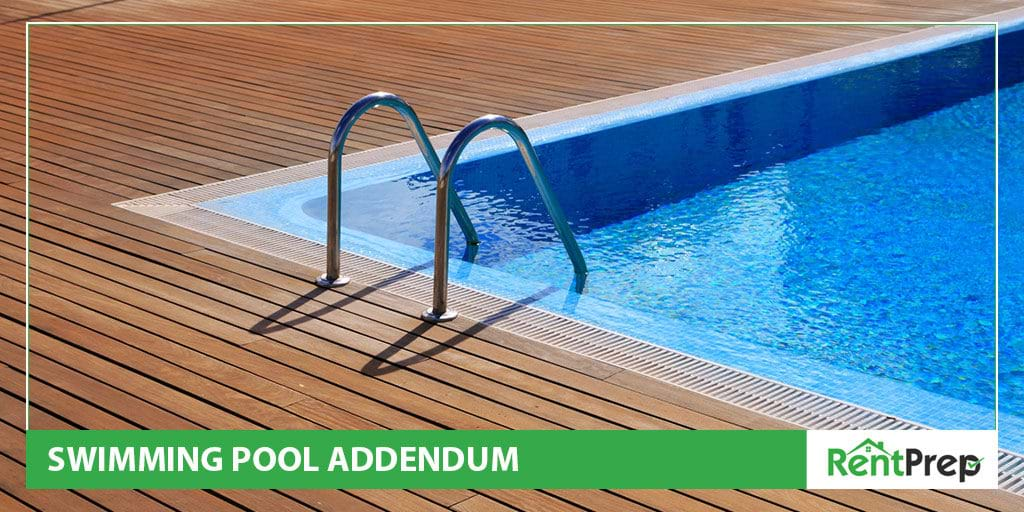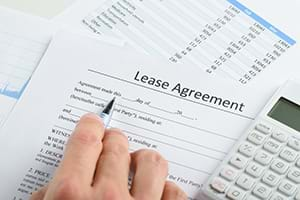
Renting out a property with pool perks can be easier than renting out similar properties without that kind of luxury amenity. Depending on where you are located, having access to a pool might be a large part of the reason why tenants choose your property over someone else’s.
With pool power, however, comes pool responsibility! Not only do you need to be sure that you follow proper procedures to maintain pool safety, but you also need to be sure that your tenants are compliant with and aware of all pool rules. To legally guarantee that they have been given the appropriate information, it’s best to use a swimming pool addendum.
Today, we’ll be sharing our sample form as well as information that is invaluable to landlords renting out properties with pool access. By the end of today’s guide, we hope that you’ll have all of the information needed to grant safe and proper access.
A Table Of Contents For Swimming Pool Addendum Form
- The Pros And Cons Of Owning Rental Properties With Pools
- Why You Need To Add Swimming Pool Addendum To Lease?
- Sample Swimming Pool Lease Addendum Form
The Pros And Cons Of Owning Rental Properties With Pools
 Keeping up with the maintenance that a pool requires can be an overwhelming task for any homeowner; it can be an even more overwhelming task for landlords and property managers. Still, there are both pros and cons to investing in a property with a pool or adding a pool as an amenity to a property you have.
Keeping up with the maintenance that a pool requires can be an overwhelming task for any homeowner; it can be an even more overwhelming task for landlords and property managers. Still, there are both pros and cons to investing in a property with a pool or adding a pool as an amenity to a property you have.
Pros
There are a number of benefits to owning a rental building that has a pool, particularly when it is a multi-unit building.
This pool is a huge attraction point, and you can even charge more rent because of this great amenity. Depending on where you live, finding tenants that want to live in your property may be easier if you have a property with a pool versus having one that does not have a pool.
The overall property value goes up when a pool is involved, and you can also set up a maintenance cost system that allows you to maintain the complex’s pool with little extra cost to you. This means that it can be a cost-efficient way to increase your bottom line without too much financial risk.
The biggest appeal to landlords is typically the potential for financial gain when renting properties with pools.
Cons
Of course, having a pool on your property sets up you with a lot of risk and liability. There are even people that don’t want to rent a single-family home with a pool because it could be dangerous for their family. Others will not want to pay additional built-in fees to use the pool at a multi-unit location.
If you’re managing a multi-unit building with a pool in the common area, you’ll be dealing with a lot of different factors while you manage the pool:
- Security
- Safety
- Cleaning
- Upkeep
- Repairing fixtures
- Collecting pool fees
- … and much more!
The pool is a great feature, and tenants are sure to love it – but you will have to do a lot to keep up with everything that is required.
If you are renting out a single-family home with a pool, things will be difficult in a different way. When signing the lease, you and the tenant will need to make some decisions about the pool:
- Will they take on the responsibility of regular maintenance for the pool, or would they rather pay a service to do that?
- Do they understand how to clean the pool?
- How often will you need to check on the pool to ensure it is properly maintained?
- What will happen if the pool or pool equipment is damaged?
With all manageable things to figure out, a pool is much more expensive than a washer or another appliance in the home. If any damages happen, they can be costly, and the tenant might fight the need to pay. As such, you need to be on your guard to ensure the pool is properly maintained at all times.
No matter what type of building your rental’s pool is at, you will need to be sure that you have the proper landlord insurance in place to protect you from costly liability damages. Even a perfectly maintained pool can be home to a tragic event, and you want to be sure that both you and your tenant have the best support possible should an injury occur.
Why You Need To Add Swimming Pool Addendum To Lease?
 Now that you know a bit more about the pros and cons of renting out a property that has a pool, it is time to talk about why a swimming pool addendum to lease terms is essential.
Now that you know a bit more about the pros and cons of renting out a property that has a pool, it is time to talk about why a swimming pool addendum to lease terms is essential.
There are a lot of risks to having a swimming pool at the property, and you need to be sure that your tenant is going to do their part to negate the safety and financial risks. The only way to hold a tenant accountable for their actions is to use a swimming pool lease addendum.
The addendum serves a few main purposes:
- Outline financial liabilities
- Outline pool rules
- Determine and designate pool responsibilities
- Reduces liability and risks
To get the full picture of why pool addendums are necessary when leasing to tenants, keep reading to see the breakdown of what is in the addendum and why.
Sample Swimming Pool Lease Addendum Form
This free residential lease agreement swimming pool addendum will help you to create your custom personalized addendum:
| Swimming Pool Lease Addendum Form |
To be able to decide whether or not you need to make any modifications to the addendum before using it, however, you will need all the information we have about why this addendum is written as it is.
Identifying Information
We always start our lease documents and addendums off with the same basic identifying information:
- Date
- Rental address
- Tenant names
While everyone involved knows this information, having it on the document itself ensures that there can be no confusion about who signed this document for what property.
Addendum Introduction
The next section begins with an introductory statement, which says the following:
“This swimming pool addendum is to disclose the rules of the pool/hot tub located at the residence listed. Use of the pool is open to all tenants provided that the following rules are acknowledged and followed at all times:”
As you can see, that introduction clarifies what the document is and what else will be explained. Now, let’s break down the included rules to give you an idea of why and when to use them.
1. At Your Own Risk: Clarify that all use of the pool is at the tenant’s own risk. This is essential for liability reasons.
2. Age Restriction: Let the tenants know up to what age children must be supervised at the pool to ensure they are kept safe.
3. and 4 Caution: Remind tenants it is their duty to try to be careful and safe when using the pool, as it can be dangerous. Additionally, tell them that the landlord is not liable or responsible for injuries that happen while swimming.
5. Pool Limitations: Inform tenants that there may be times when the pool temperature cannot be maintained or that the pool will not be usable for short periods due to uncontrollable weather or maintenance issues.
6. Responsibility: Clarify who is responsible for maintenance, financially, and otherwise. For multi-unit apartments, this must be the landlord.
7. Damages: Include a note that damages caused by the tenant may be their financial responsibility.
8. Privileges: If the tenant doesn’t follow the rules above, their privileges can be revoked at any time at the landlord’s discretion.
Additional Rules
As much as you want to trust that the tenants you carefully chose will treat your pool right, you need to protect your business by being as thorough as possible.
Depending on your local and state laws, you may want to include additional rules in this list to ensure that your pool is used in the right way. In states like Maryland, for example, pools must be fenced in, so you should let your tenants know that they have a responsibility to keep the gates closed and properly locked at all times.
You may want to also include information about inviting guests. While some complexes allow people to bring as many guests as they want to the pool, this may be unfair to your other residents. Consider what you think is reasonable for guests and ensure that this information is conveyed to all tenants.
If you have specific security procedures for getting into and out of the pool area, you will also want to include this in the addendum so that everything is agreed upon in writing. The security measures need to be followed, so having some accountability in the addendum is a good idea.
Picture Perfect Pool Days
With the right addendum in hand, you and your tenants can have picture-perfect pool days without much stress about the rules of the pool. Putting everything into writing from the very beginning makes using the pool more comfortable for all parties, and it also makes everything much safer.
Protect yourself, your property, your pool, and your tenants with the right swimming pool addendum.

